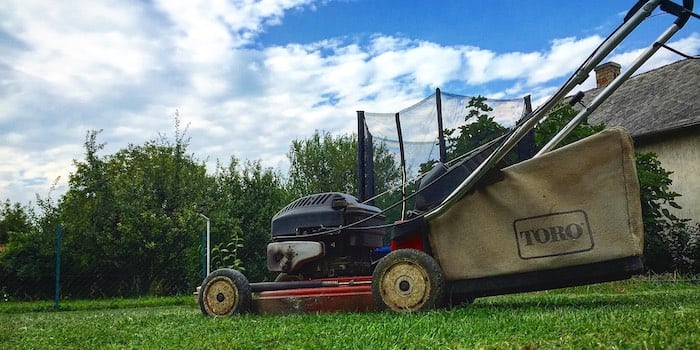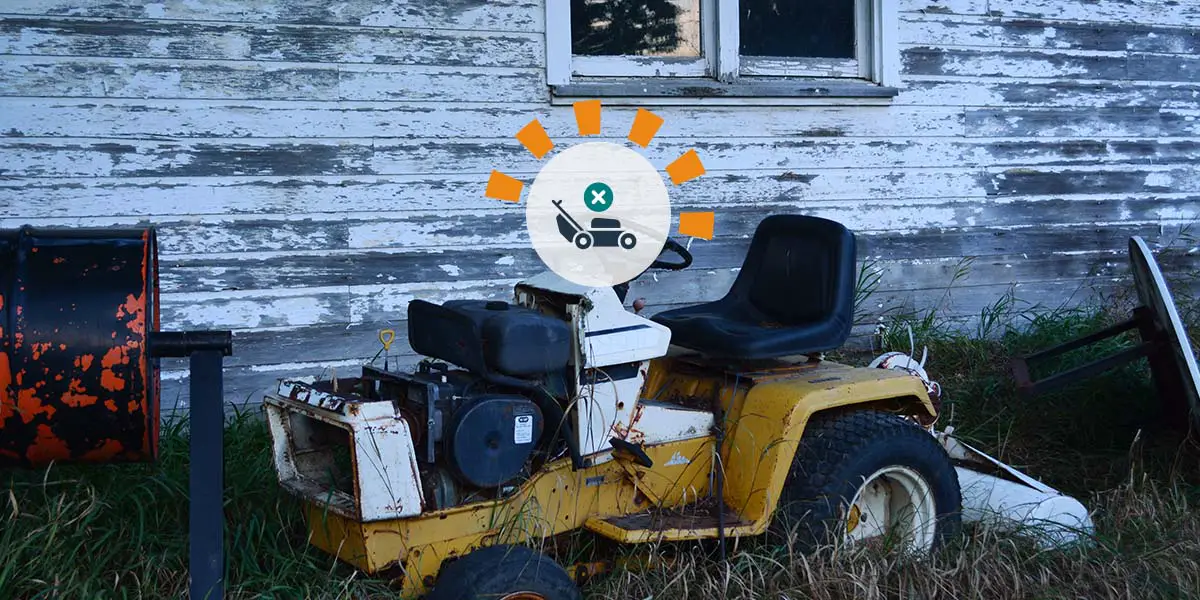To dispose of a riding lawn mower, sell it, recycle it, or take it to a scrapyard. Donate it to a local community organization if it’s still operational.
Disposing of a riding lawn mower requires thoughtful consideration of environmental and safety concerns. Owners must decide whether their mower is fit for a second life or ready for recycling. Selling a functional mower can extend its usefulness and provide an economic return.
For machines beyond repair, recycling is an eco-friendly option, ensuring metals and other materials are repurposed. Scrapyards offer a viable solution for completely unsalvageable mowers. Donation is another avenue, supporting local organizations while avoiding waste. This process is not just about getting rid of an old item but also about making responsible choices that benefit the community and the environment.

Credit: trashwizard.com
Introduction To Eco-friendly Disposal
Disposing of old equipment like riding lawn mowers requires thought. Not only do you want to remove the item, but you also want to do it responsibly. This section explores eco-friendly ways to say goodbye to your old mower.
The Importance Of Safe Disposal
Safe disposal protects your community and environment. It prevents pollutants from damaging nature.
- Prevent leaks of harmful fluids.
- Stop metals from entering landfills.
- Encourage recycling and reuse.
Environmental Impact Of Lawn Mowers
Lawn mowers can have a significant environmental impact.
| Part | Impact |
|---|---|
| Engine | Releases CO2 emissions. |
| Battery | Contains toxic chemicals. |
| Blades | Can be recycled for metal. |

Credit: goloadup.com
Preparation Steps Before Disposal
Before saying goodbye to your riding lawn mower, preparation is key. This guide covers essential steps to ensure a safe and responsible disposal. Follow each step carefully for the best results.
Draining Fluids
First, drain all fluids from the mower. This includes oil and gasoline, which are harmful to the environment. Use a siphon pump for gasoline and an oil drain pan for oil. Wear gloves to keep hands clean and safe.
- Gasoline: Store in a certified container for reuse or recycling.
- Oil: Collect in a pan. Take to a recycling center.
Separating Reusable Parts
Next, identify parts that others can reuse. Parts like batteries, tires, and metal components are valuable. They can live a second life in different machines or projects.
| Part | How to Recycle |
|---|---|
| Battery | Take to a battery store or recycling center. |
| Tires | Local garage or recycling facility may accept them. |
| Metal Components | Sell to a scrap metal dealer or recycle. |
Remember, removing these parts requires care. Use the right tools and follow safety guidelines.
Recycling The Metal Components
Recycling the metal parts of a riding lawn mower is smart and eco-friendly. It reduces waste and saves resources. Most of the mower is metal and can be recycled. Let’s explore how to turn an old mower into something new.
Identifying Recyclable Metals
First, spot the metals in your mower. Lawn mowers have steel and aluminum. These metals are perfect for recycling. Look for the frame, deck, and engine parts. These are the main metal components. Use a magnet to test; steel will stick, aluminum won’t. This test helps sort the metals.
Finding A Recycling Facility
Next, find a place that takes scrap metal. Use online tools to locate nearby facilities. Call ahead to confirm they accept mower parts. Some places might even pay for the scrap metal. Make sure to transport the mower safely to the facility.
Battery Disposal And Safety
Proper battery disposal is crucial for the environment. Riding lawn mowers contain batteries that must be handled with care. Let’s dive into how to dispose of these batteries safely.
Types Of Batteries In Mowers
Different lawn mowers use different batteries. Knowing your mower’s battery type is key. This ensures correct and safe disposal.
- Lead-Acid Batteries: Common in older models.
- Lithium-Ion Batteries: Found in newer mowers.
- Nickel-Cadmium Batteries: Less common but still in use.
Proper Battery Recycling Methods
Recycling mower batteries is a responsible choice. Follow these methods to recycle properly:
- Turn off the mower and remove the battery.
- Wear gloves for protection.
- Store the battery in a cool, dry place.
- Take the battery to a certified recycling center.
Some stores offer battery recycling services. Check local regulations for battery disposal.
Donating Your Riding Lawn Mower
Donating your riding lawn mower is a great idea. It helps others and the environment. Let’s explore how to do it right.
Benefits Of Donating
- Helps community programs.
- Reduces waste in landfills.
- Possible tax deductions.
- Gives your mower a second life.
Where To Donate
Many places accept riding lawn mowers. Here are some:
| Place | Contact |
|---|---|
| Local schools | Call the school’s office. |
| Non-profits | Check their website. |
| Community centers | Visit for details. |
Repurposing Old Lawn Mowers
Don’t throw away that old riding lawn mower! With a bit of creativity, you can give it a new life. Repurposing extends the usefulness of your mower beyond cutting grass. It’s eco-friendly and can be fun, too.
Creative Repurposing Ideas
Transform your old mower into something new and exciting. Consider these ideas:
- Planter: Remove the engine and fill it with soil for a quirky garden feature.
- Go-kart: Modify the engine and frame for an exciting ride-on toy.
- Utility cart: Strip it down to carry tools and supplies around your yard.
Safety Considerations In Repurposing
Safety is key when repurposing your mower. Follow these tips:
- Wear protection: Use gloves and goggles during the process.
- Remove the battery: Prevent shocks by disconnecting the battery first.
- Drain fluids: Empty all the oils and gasoline to avoid spills and fires.
Selling For Parts Or Repair
Old riding lawn mowers might seem worthless. Yet, selling them for parts or repair can fetch a surprising sum. Discover how to turn your mower’s demise into dollars.
Assessing The Value
Check your mower’s condition. Note all usable parts. Brands like John Deere or Husqvarna often have higher demand.
Consult online forums or local repair shops for part values. Set realistic prices based on your findings.
- Engine
- Battery
- Wheels
- Deck
- Seat
Even non-working mowers have value. Metals like steel and aluminum can be sold for scrap.
Where To Sell
Choose the right platform to reach potential buyers.
| Platform | Best For | Tips |
|---|---|---|
| eBay | Parts | Use clear photos |
| Craigslist | Whole mower | List as “for parts/repair” |
| Facebook Marketplace | Local buyers | Offer pick-up options |
Post ads on local classifieds or lawn mower forums. Use descriptive titles and detailed descriptions.
Remember to stay safe. Meet in public spaces and accept cash or secure online payments.
Local Waste Management Options
When it’s time to say goodbye to your old riding lawn mower, knowing your local waste management options is crucial. Disposing of such large equipment responsibly helps protect the environment. Your local services may offer convenient and eco-friendly disposal solutions.
Understanding Local Regulations
Each area has unique rules for disposing of large items like mowers. Check with your local waste management authorities for specifics. They provide guidelines and restrictions. This ensures you follow legal and environmental standards.
Scheduling A Pickup
Many waste management services offer bulk pickup for large items. You may need to schedule a pickup in advance. Some services might charge a fee. Reach out to your local facility for details on booking and costs.
Remember, a clean planet starts with responsible disposal. Your local waste management services are there to help. Make use of them for a greener tomorrow.
Eco-friendly Upkeep For Future Use
Proper upkeep extends a riding mower’s life and protects the planet. Follow these tips for eco-friendly maintenance.
Maintaining Your Mower
- Clean after each use to prevent rust and debris build-up.
- Check the oil regularly and change it as needed.
- Sharpen blades to ensure clean cuts and reduce strain on the engine.
- Store in a dry place to avoid moisture damage.
- Recycle old parts and fluids at certified centers.
Eco-friendly Lawn Mower Alternatives
| Type | Benefits |
|---|---|
| Electric Mowers | Less noise, no emissions. |
| Reel Mowers | Zero emissions, manual power. |
| Solar Mowers | Renewable energy, low running costs. |

Credit: indylawnmowerrecycle.com
Conclusion: The Path To Green Disposal
Disposing of a riding lawn mower responsibly matters to our planet. Let’s explore how to do it the green way.
Summarizing Key Points
- Recycle – Turn your mower into something new.
- Donate – Give it to someone in need.
- Sell for parts – Make money and recycle at the same time.
- Local scrap yards – They can recycle it properly.
Encouraging Sustainable Practices
We must think of the Earth. Choosing green disposal helps everyone.
By recycling, we save resources. Donating helps others. Selling parts supports recycling. Scrap yards know how to dispose of mowers safely.
Every action we take makes a difference. Let’s choose wisely for a better tomorrow.
Frequently Asked Questions
Can I Recycle My Old Riding Lawn Mower?
Yes, you can recycle your old riding lawn mower. Most metal recycling centers accept lawn mowers. Ensure the mower is free of oil and gas before recycling.
What Is The Proper Way To Dispose Of A Mower Battery?
Proper disposal of a mower battery involves taking it to a recycling center. Battery retailers often offer recycling services. Never dispose of batteries in regular trash.
How Do I Drain Fuel Before Disposing Of My Mower?
To drain fuel, run the engine until it stops or use a siphon pump. Dispose of the old fuel at a hazardous waste facility. Do not pour it down the drain.
Where To Find Local Hazardous Waste Disposal For Mower Oil?
Local hazardous waste disposal for mower oil can be found through your city’s waste management services or by visiting Earth911. com for nearby disposal centers.
Conclusion
Disposing of your old riding lawn mower responsibly is essential. This guide aimed to simplify the process, ensuring eco-friendly methods are your go-to. Remember, donating or recycling offers a second life to your equipment. By choosing these paths, you contribute to environmental conservation while decluttering efficiently.
Let’s make sustainable choices for a greener tomorrow.

